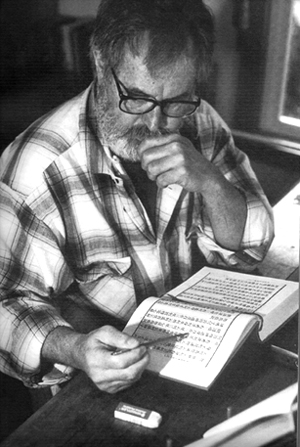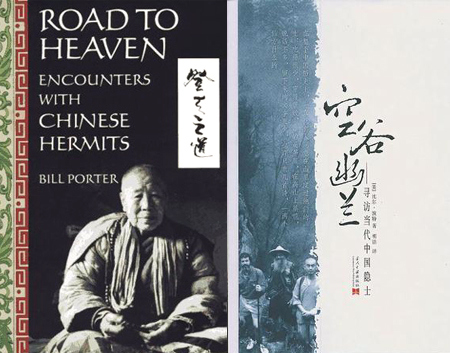Under the literary pseudonym Red Pine, Bill Porter has become one of the foremost Chinese poetry and essay translators in the world. On October 16 inside Beijing's Bookworm Library/Café/Bookstore (Building 4, Nan Sanlitun, Chao Yang District) Mr. Porter gave a slideshow presentation along with a talk about his book Road to Heaven: Encounters with Chinese Hermits.
Front covers of Bill Porter's Road to Heaven: Encounters with Chinese Hermits: the original English edition (L) and a Chinese translation.
Born in Los Angeles in 1943, Porter grew up in Northern Idaho, did a short stint in the US Army and then attended college at UC Santa Barbara. He enrolled for graduate school in anthropology at Columbia University but dropped out halfway through his Ph.D. program. Instead he flew to Taiwan, entered a Buddhist monastery and spent four years with the monks and nuns before leaving to work for various English language radio stations in Taiwan and Hong Kong. Afterwards he spent sixteen years in a rural Taiwanese monastery, translating classics in Chinese poetry.
"I don't affiliate myself with any institutions anymore," Porter quipped during his talk. Respected as a translator, he also is recognized as a cultural commentator and poet in his own right. A celebrated author, Porter frequently traverses the globe, from the North America to Asia. He is married to a Taiwanese woman he met while studying at his first monastery; their two children are now grown. Eccentric and kind, Bill Porter charmed his audience with his modesty, knowledge and humor. This highly educated eccentric has turned his love of Chinese poetry and religious philosophy into his life's work and created a unique lifestyle for himself.
In 1989 Porter came to the Chinese mainland because he wanted to know whether the hermit tradition still survived. "Chinese thought and religion places great importance on solitude," Porter said. His book Road to Heaven: Encounters with Chinese Hermits (Mercury House) has helped revive interest in that subculture. Porter told his audience that seclusion is a necessary rite of passage for any hermit, whether Taoist, Confucian, Buddhist or Zen, and he compared the rite of going into isolation as akin to earning a Ph.D. in the West.
"Hermits are monks and nuns looking for wisdom. Many go up the mountain for three to five years, just like graduate students go to school. Doing time as a hermit earns respect in Chinese society, it shows sincerity and implies knowledge." Porter explained that all great masters had spent time in solitude in order to master their practice, gaining profundity and knowledge. In this way new orders and traditions were founded.
"Certainly there are hermits who stay in seclusion all their lives, never rejoining society. Some of them are very powerful people. The old nun on the cover of my book is such a person. She was 88 when she died; they cremated her but her heart remained intact. That was a pretty powerful hermit."
|

Bill Porter
|
Porter gave many other fascinating anecdotes about the hermits he met as well as a quick overview on the history of the most revered hermits, telling where they settled and how contemporary Chinese view them today.
"Every sect and religion has its own mountainous area where hermits settle," he said. "Lao Tzu went to Huashan, Confucians went to Taishan, and the first Buddhist, Matanga, went to Wutaishan. Their disciples followed them over time. I feel that the hermit tradition is alive and well in China today. I think that it was scarcely affected during the Cultural Revolution because these people lived in such out of the way and hard to reach places. Some monks were pulled down from the mountaintops to serve on work brigades for six months but most were not affected at all," Porter said.
Porter explained that a symbiotic relationship existed between Chinese hermits and the local people – farmers and villagers. The locals would assist a hermit in their area because he or she was considered auspicious and a source of wisdom if not enlightenment. The hermit, unless very clever, needed a bit of help to survive. "All a hermit requires is salt, flour or rice, oil and kerosene," said Porter. "But villagers often gladly help out by giving him or her some additional food as well as the essentials, if necessary. And the hermits actually have a kind of network: they help each other, visit each other, take care of each other. Just because they are in seclusion doesn't mean that they aren't friendly and gregarious. The Chinese tradition is very different from the Western tradition, where we often think of hermits as misogynistic and even violent at times."
When asked about the state of Chinese organized religion today, Porter explained that most monasteries generally relied on wealthy patrons and government support to function, while hermits relied on locals and some were completely autonomous. "You know the Zen tradition has a saying of 'carry water, chop wood' – they were the first to implement the idea of monasteries supporting themselves through their own efforts, farming and whatnot. They even have guesthouses for travelers, so monks can travel around, staying at other places for three nights. It might be a good idea for the Chinese government to let these Zen monasteries have their land back so this tradition of autonomy can continue to flourish."
Porter stayed afterward and answered questions for a long time. "He's very talented," remarked a Chinese guest. "His other books, translations of Chinese poetry, seem to come from his heart as well as his knowledge. Mr. Porter has truly caught the spirit of China's poets. I think he also understands our hermits as well."
Other books by Bill Porter:
- The Clouds Should Know Me by Now: Buddhist Poet Monks of China (With Mike O'Connor)
- Road to Heaven: Encounters With Chinese Hermits
- The Heart Sutra: Translation and Commentary by Red Pine (as Translator and Commentator)
- Lao-Tzu's Taoteching: With Selected Commentaries of The Past 2000 Years (as Translator)
- The Zen Teachings of Bodhidharma: A Bilingual Edition (as Translator)
- The Collected Songs of Cold Mountain (as Translator, Hanshan)
- The Diamond Sutra: The Perfection of Wisdom (as Translator)
- The Zen Works of Stonehouse: Poems and Talks of A Fourteenth-Century Chinese Hermit (as Translator)
(China.org.cn by Valerie Sartor, October 17, 2007)



